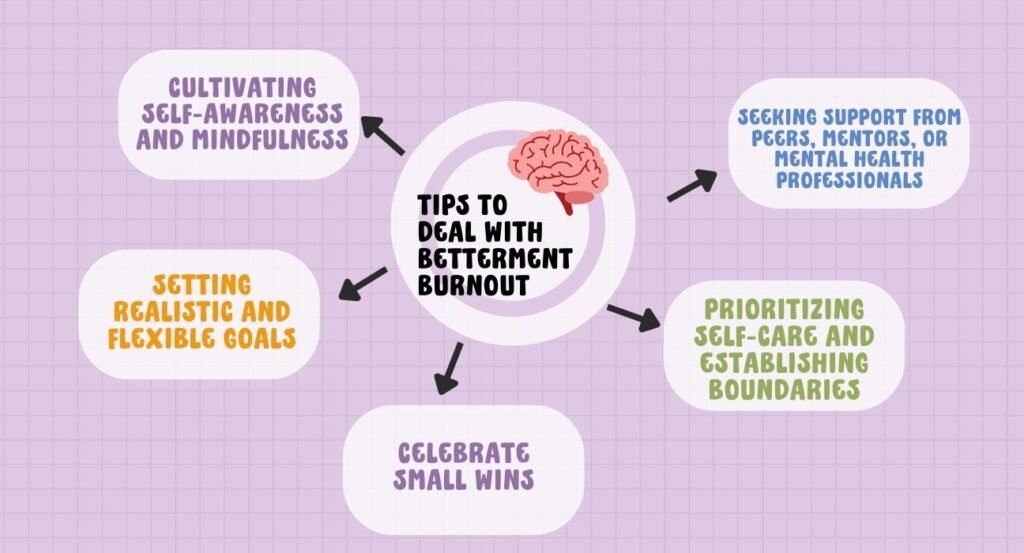“Make a to-do list first in the morning”, your favourite influencer tells you. You want to be as disciplined as her- wake up at 5 am, work out, eat healthy, get all your tasks done and also somehow have time for your hobbies- so you listen to her advice. You make a to-do list, but by the time the day comes to an end, you realize you haven’t completed even half the tasks from your list. It immediately puts you down. What was supposed to help motivate you, makes you feel worthless instead!
What is Betterment Burnout?
Betterment burnout refers to a state of exhaustion or fatigue that arises from the constant pursuit of self-improvement or personal development goals. It occurs when individuals push themselves too hard in their efforts to become better versions of themselves, often leading to stress, overwhelm, and a feeling of being overwhelmed by the sheer volume of tasks and goals they set for themselves. It is the pressure of always striving to be your best self.
Its significance increases when you take into consideration the fast-paced society that we live in. As soon as you open social media, you are flooded with content by influencers teaching you to make the best out of your day, to be productive and to stand out from people. It is unconsciously teaching us that we are not enough; that we need to constantly strive to be better.
Read More: Breaking the Cycle of Self-Doubt and Negative Thinking
It can be a rather dangerous outlook. It is easy to compare ourselves to individuals online who pretend to be super productive and to think that we are worthless. It can take a huge toll on our mental health. It can break down our self-confidence; we are constantly scared of falling behind.
Signs and Symptoms of Betterment Burnout
There are signs to look out for to know if you are in your betterment burnout stage.
- Physical Manifestations: you may find yourself getting tired very easily. You are constantly exhausted and do not have the time to work productively. It may also lead to more somatic complaints, such as constant headaches or even having trouble sleeping.
- Emotional Indicators: emotional indicators include feeling perpetually anxious about not getting your tasks done, being irritable and on edge and even being sad about not being good enough. You also start experiencing feelings of negativity, cynicism and despair.
- Behavioural patterns: you may also change your behaviour in some ways. You may start to actively avoid your responsibilities. Betterment burnout may start to become counterproductive- it can actively decrease your productivity.
Why does it happen?
The foremost problem is setting unrealistic goals. It is important to have a good understanding of our own abilities. Do not get overly influenced by social media creators and self-help gurus who tell you seize the moment- in every moment! Knowing what you can and cannot do will help you be confident in your abilities and avoid going down the unending spiral of trying to achieve something that may be unachievable.
The new trend of perfectionism is extremely toxic. It instills in us a deep-seated fear of failure– of being left behind or of not being as good as others. We are always striving to be perfect in everything we do. But what we don’t realize is that to make mistakes is to be human. We are not a machine- the process of learning also includes possibly failing many times.
There may also be some underlying reasons that do not directly contribute to betterment burnout, but may be a factor. The first is the cultural expectations and societal pressures that we are subjected to. In Western, individualistic cultures the constant feeling of competition with peers is felt, even at a young age. In India too, with such a huge population, people, especially students, are constantly worried and push themselves to be better than others.
Comparison culture being promoted on social media can be extremely harmful. It is very difficult to separate yourself from it. Everywhere you see, on Linkedin, Twitter, etc., everyone is posting about their experiences and their wins. It can make you feel like you are just sitting around and not doing anything. This can be very harmful.
When Self-Improvement Becomes Self-Destructive
You may question, isn’t self-improvement desirable? Aren’t we all at the end of the striving to be better versions of ourselves?
Yes, we are. And yes, it is desirable to self-improve. But, betterment burnout describes a situation wherein we move past simply improving ourselves. We enter into a state of frenzy; not stopping until we have achieved all of our goals. You want to be the best guitar player, the smartest orator, the most competitive baker- all of it at once. You know longer want to improve; you want to be the absolute best- nothing short of the best will do.
It can lead to a diminished sense of fulfillment despite achievements. You start ticking off everything you wanted to achieve- learnt the guitar, learnt to bake- but you still remain unsatisfied. What else can I do? Should I learn to skate? Learn a complicated dance routine? You do all of it, but still do not get the sense of achievement that you should be. This can greatly break down your self-esteem.
It leads to you developing a persistent feeling of inadequacy. You do not feel any better about yourself even after completing the hardest of tasks. You continue to feel that everyone else is better than you, that you are not and will never be enough.

Strategies for Prevention and Management
Betterment burnout can greatly mess with your mental health. It is important to understand that you are in a very vulnerable place and to take the right steps to curb this at the appropriate time.
- Cultivating self-awareness and mindfulness: be mindful of the kind of faulty cognitive pattern that you are following. Learn to be self-aware enough to remind yourself that what you are practising is harmful. Learn to take a step back when it is necessary.
- Setting realistic and flexible goals: understanding your capabilities is necessary. Do not chase what cannot be achieved. It will continue to make you disappointed and lead to a never-ending cycle of disappointment. Set realistic goals that you can achieve.
- Celebrate small wins: it is important to check in and appreciate yourself on what you have managed to achieve. Learn to embrace imperfection and celebrate progress.
- Prioritizing Self-care and establishing boundaries: learn to say no to tasks. Learn to acknowledge that not everything is meant for you. Create that essential boundary between yourself and the rest of the world- do not let them influence you to this extent.
- Seeking support from peers, mentors, or mental health professionals: Always remember, that asking for help is not a sign of weakness but one of strength. Have a social support system and reach out to them. It is also advisable to seek professional help if things get unmanageable.
Key Takeaway
This article talks about the destructive cycle of betterment burnout- a constant relentless pursuit of perfection. It talks about the ways to combat it and also discusses its root causes. It is important to not fall into this cycle of burnout and to seek help when necessary. Remember, you are your individual and are on your journey. Do not let other people talk you down into thinking that you are not enough.
Read More From Psychologs
- Mantra Meditation: A guide to Inner peace and Tranquility
- What is EFT Tapping and How does it Work?
- The Essential Art of Ignoring for Inner Peace
- 9 Key Teachings of Budhha that will help you gain Inner peace
References +
- Essence. (2024, March 9). WATCH: Elsa Majimbo Shares Why She Won’t Change Her Accent for Opportunities. Essence. https://www.essence.com/news/watch-elsa-majimbo-shares-why-she-wont-change-her-accent-for-opportunities/
- Kapur, J. (2024, March 10). We are living in the betterment burnout era: Here is how to tell. Sportskeeda. https://www.sportskeeda.com/health-and-fitness/we-living-betterment-burnout-era-here-tell
- Rastogi, S. (2024, March 12). How to combat ‘betterment burnout’ that’s taking an emotional toll on women. The Indian Express. https://indianexpress.com/article/lifestyle/life-style/betterment-burnout-pressure-women-self-acceptance-self-help-culture-9200627/













Leave feedback about this